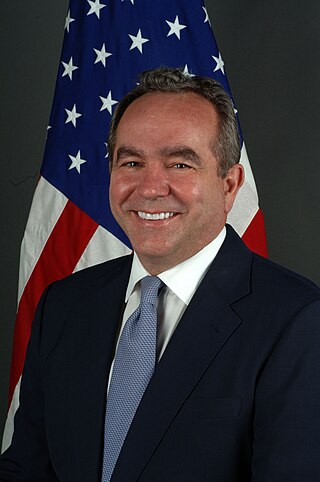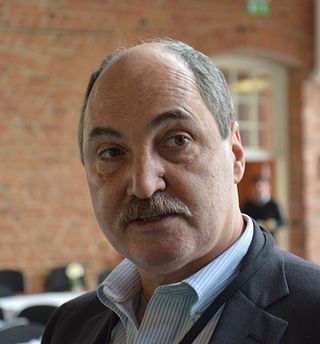Related Research Articles
Neorealism or structural realism is a theory of international relations that emphasizes the role of power politics in international relations, sees competition and conflict as enduring features and sees limited potential for cooperation. The anarchic state of the international system means that states cannot be certain of other states' intentions and their security, thus prompting them to engage in power politics.
In international relations, power is defined in several different ways. Material definitions of state power emphasize economic and military power. Other definitions of power emphasize the ability to structure and constitute the nature of social relations between actors. Power is an attribute of particular actors in their interactions, as well as a social process that constitutes the social identities and capacities of actors.
In international relations, the liberal international order (LIO), also known as the rules-based international order (RBIO), or the rules-based order (RBO), describes a set of global, rule-based, structured relationships based on political liberalism, economic liberalism and liberal internationalism since the late 1940s. More specifically, it entails international cooperation through multilateral institutions and is constituted by human equality, open markets, security cooperation, promotion of liberal democracy, and monetary cooperation. The order was established in the aftermath of World War II, led in large part by the United States.
Bilateralism is the conduct of political, economic, or cultural relations between two sovereign states. It is in contrast to unilateralism or multilateralism, which is activity by a single state or jointly by multiple states, respectively. When states recognize one another as sovereign states and agree to diplomatic relations, they create a bilateral relationship. States with bilateral ties will exchange diplomatic agents such as ambassadors to facilitate dialogues and cooperations.

Joseph Samuel Nye Jr. is an American political scientist. He and Robert Keohane co-founded the international relations theory of neoliberalism, which they developed in their 1977 book Power and Interdependence. Together with Keohane, he developed the concepts of asymmetrical and complex interdependence. They also explored transnational relations and world politics in an edited volume in the 1970s. More recently, he pioneered the theory of soft power. His notion of "smart power" became popular with the use of this phrase by members of the Clinton Administration and the Obama Administration.

Realism, a dominant school of thought in international relations theory, is a theoretical framework that views world politics as an enduring competition among self-interested states vying for power and positioning within an anarchic global system devoid of a centralized authority. It centers on states as rational primary actors navigating a system shaped by power politics, national interest, and a pursuit of security and self-preservation.
Polarity in international relations is any of the various ways in which power is distributed within the international system. It describes the nature of the international system at any given period of time. One generally distinguishes three types of systems: unipolarity, bipolarity, and multipolarity for three or more centers of power. The type of system is completely dependent on the distribution of power and influence of states in a region or globally.

Gilford John Ikenberry is a theorist of international relations and United States foreign policy, and the Albert G. Milbank Professor of Politics and International Affairs at Princeton University. He is known for his work on liberal International Relations theory, such as the books After Victory (2001) and Liberal Leviathan (2011). He has been described as "the world's leading scholar of the liberal international order."
Liberal internationalism is a foreign policy doctrine that supports international institutions, open markets, cooperative security and liberal democracy. At its core, it holds that states should participate in international institutions that uphold rules-based norms, promote liberal democracy and facilitate cooperation on transnational problems.

Michael Jonathan Green is an American Japanologist currently serving as CEO of the United States Studies Centre. He is also a member of Radio Free Asia's board of directors.

Victor D. Cha is an American academic, author and former national foreign policy advisor.
Michel Charles Oksenberg was an American political scientist and China watcher who moved between academia and policy work. As a senior member of the National Security Council, he was closely involved in the normalization of U.S.-China relations undertaken during the administration of President Jimmy Carter, who said, "Mike Oksenberg changed my life—and changed the life of this country, and to some degree changed the life of every citizen of China."

Kurt Michael Campbell is an American diplomat and businessman currently serving as the National Security Council coordinator for the Indo-Pacific. In this capacity, Campbell has been referred to as the Biden administration's "Asia coordinator" or "Asia czar"—chief architect of Joe Biden's Asia strategy.

James Andrew Lewis is a Senior Vice President and the Director of the Technology and Public Policy Program at the Center for Strategic and International Studies (CSIS) in Washington, D.C.
Kenneth B. Pyle is a Japan historian and professor emeritus of History and International Studies at the University of Washington Seattle campus. He earned his BA from Harvard College in 1958. Since earning his PhD in Japanese History from Johns Hopkins University in 1965, he has become a major figure in the area of Japan studies, publishing several books on Japan and its international relations, serving as the first editor of the Journal of Japanese Studies from 1974 to 1986 and director of the Henry M. Jackson School of International Studies at the University of Washington from 1978 to 1988, and appointed by President George H. W. Bush to chair the Japan-U.S. Friendship Commission from 1992 to 1995. In 1998, the Japanese government awarded Pyle with the Order of the Rising Sun, and in 2008 he received the Japan Foundation Award for Japanese Studies.
The National Bureau of Asian Research (NBR) is an American non-profit research institution based in Seattle, Washington, with a branch office in Washington, D.C.
Liberal institutionalism is a theory of international relations that holds that international cooperation between states is feasible and sustainable, and that such cooperation can reduce conflict and competition. Neoliberalism is a revised version of liberalism. Alongside neorealism, liberal institutionalism is one of the two most influential contemporary approaches to international relations.
David Laurence Aaron is an American diplomat and writer who served in the Jimmy Carter and Bill Clinton administrations. He graduated from Occidental College with a BA, and from Princeton University with an MPA. He later received an honorary Ph.D. from Occidental College. He is currently director of the RAND Corporation's Center for Middle East Public Policy.
Charles Louis Glaser is a scholar of international relations theory, known for his work on defensive realism, as well as nuclear strategy. He is the founding director of the Institute for Security and Conflict Studies at the George Washington University's Elliott School of International Affairs, as well as a professor of political science and international affairs. His best-known book, Rational Theory of International Politics: The Logic of Competition and Cooperation received an Honorable Mention for 2011 Best Book from the International Security Studies Section of the International Studies Association.
The Center of International Studies (CIS) was a research center that was part of Princeton University's Woodrow Wilson School of Public and International Affairs in Princeton, New Jersey. It was founded in 1951 by six scholars who came to Princeton from Yale Institute of International Studies under the leadership of the center's first director, Frederick S. Dunn. By 1999, its stated mission was to "promote world peace and mutual understanding among nations by supporting scholarship in international relations and national development" and to "support analysis of abiding questions in international security and political economy". In 2003, the center was merged with the university's regional studies programs to form the considerably larger Princeton Institute for International and Regional Studies.
References
- ↑ Aaron Louis Friedberg. Detroit: Gale. 2006.
{{cite book}}:|work=ignored (help) - ↑ "NBR Bulletin". NPR. March 2002. Archived from the original on 2004-08-14. Retrieved 2004-08-20.
- ↑ "NBR's Pyle Center for Northeast Asian Studies". Archived from the original on 2018-09-07. Retrieved 2009-08-26.
- ↑ "U.S. China Policy". Archived from the original on 2015-01-28. Retrieved 2015-01-27.
- ↑ "Former Republican National Security Officials for Biden". Defending Democracy Together. 20 August 2020. Archived from the original on 20 August 2020. Retrieved 26 August 2021.
- ↑ "What is the Alexander Hamilton Society". AHS. Archived from the original on 2023-11-15. Retrieved 2023-10-17.
- ↑ "The Cross-Strait Security Situation | CSIS Events". www.csis.org. Archived from the original on 2022-06-21. Retrieved 2023-10-17.
- ↑ Christensen, Thomas J. (July 2006). "Fostering Stability or Creating a Monster? The Rise of China and U.S. Policy toward East Asia". International Security. 31 (1): 81–126. doi:10.1162/isec.2006.31.1.81. ISSN 0162-2889. JSTOR 4137540. S2CID 57571543.
- ↑ Friedberg, Aaron L. (1993). "Ripe for Rivalry: Prospects for Peace in a Multipolar Asia". International Security. 18 (3): 5–33. doi:10.2307/2539204. ISSN 0162-2889. JSTOR 2539204. S2CID 154502784.
- ↑ "Six Lessons from a Decade of Asia Strategy Simulations | German Marshall Fund of the United States". www.gmfus.org. Archived from the original on 2023-09-21. Retrieved 2023-10-18.